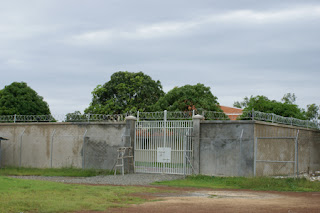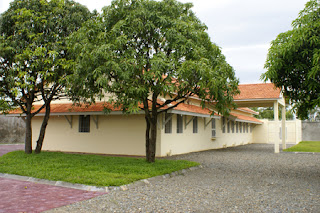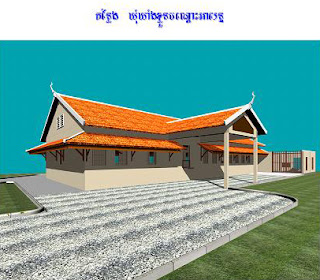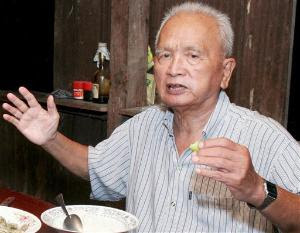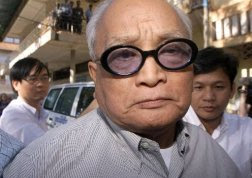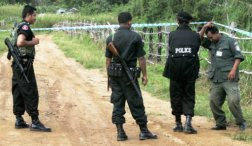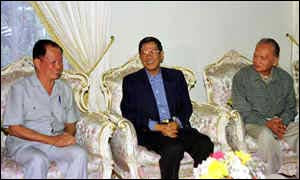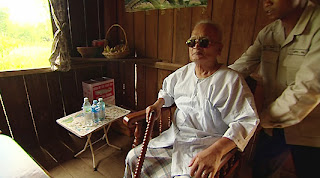Cambodia New Vision
Number 20, August 1999
--------------------------------------------------------------------------------
Samdech Hun Sen's Exclusive Interview to the Kyodo News Agency:
the Cambodian-Japanese Relations,
the Trial of the Khmer Rouge leaders, and
the Progress of the Reform, on August 17, 1999
On Cambodia-Japan Relations
Q: First of all I would like to have your opinion about the Cambodian-Japanese relations. How do you appraise the contribution of the Japanese government to your country?
A: Regarding the relations between Cambodia and Japan, especially at the latest stage, I couldsay that the results of the 1998 elections cannot be separated from the contribution of Japan.
You may remember that in November 1997 I visited Tokyo, and after that Japan played an active role, especially the four-point peace plan. The peace plan of Japan, along with its financial assistance for the Cambodian elections and that of EU, enabled us to hold a free and fair election.
I always consider the first-term government as the child of UNTAC, and this second-term government -- the current government -- the child which was delivered at the attendance of Japan and the EU.
After the elections, and after the formation of the new government, Japan continues to play an ever more important role in providing assistance to Cambodia.
We can say that the relations between Cambodia and Japan is approaching the peak in the history of the two countries' relations.
What we can take note is that the Japanese people or politicians belonging to any political parties have the consensus vis–a-vis the policy of Japan towards providing assistance to Cambodia for the sake of peace, democracy and socio-economic development in Cambodia.
Q: What is your expectation for the future relations with Japan? In which areas of assistance do you foresee?
A: We are expecting the grant aid from Japan -- Yen credit and loans, and investment in Cambodia. We know well that Japan focuses its assistance to Cambodia on building infrastructure and human resources.
We have seen and continued to see the assistance from Japan in the building of roads, bridges, ports, electricity plants, and irrigation projects...
In the Mekong sub-region development plan, I think that Japan could play the most important role through pledges made during the recent meeting between ASEAN and Japan. It is true that so far there are not many Japanese investors doing business in Cambodia... We expect more to come.
Q: Are there any special incentives that the Cambodian Government would offer to the Japanese investors?
A: Well, I think that Japan would not demand special incentives, because it is related to the implementation of the Codes of Investment. But the encouragement, I feel, we need to provide is safety, security for the Japanese investors as well as tourists. We wish that what really happened in Cambodia would be correspondingly reported to the people in Japan.
... On The Trial of the Khmer Rouge Leaders
Q: Now we come to a hot issue -- the trial of Khmer Rouge leaders. As you know that the UN legal experts are prepared to cooperate with the Cambodians on the trial. What do you think about the UN plan?
A: The trial of the Khmer Rouge leaders is a sensitive issue and it has been rekindled early this month. At the start, you used the word "the UN is prepared to come to cooperate with Cambodia for the trial of the Khmer Rouge leaders". What cooperation is it? Who cooperates with whom?
The UN comes to cooperate with Cambodia, but they would like the majority part. So this does not mean the UN comes to cooperate with Cambodia, but rather Cambodia goes to cooperate with the UN.
What they are preparing now is not to cooperate but to make every effort to be the masters, and to leave Cambodia playing a small part in the cooperation.
Through several discussions, H.E Thomas Hammarberg and I have reached the agreement that it (the trial) would be conducted by the existing courts of Cambodia with the international assistance and participation of foreign judges and prosecutors included.
Regarding the existing court of Cambodia, it has three levels -- firstly, provincial or municipal court, secondly, the appeal court, and the last one is the supreme court. But what they(the UN) are planning is to have only one level of court. It means that they want to destroy the existing structure of the court of law in Cambodia, and it is tantamount to a violation of sovereignty of an independent country which is also one of its members.
On the 30 July 1999, I should criticize frankly, there was a very bad attempt to bring the issue of the trial to the UN Security Council, an agenda of which some members of the UN Security Council has no knowledge of.
This could be an attempt to internationalize the trial... by using the resolution, not at the Cambodian request, of the UN Security Council. Such an act should not be done by the UN whose respect should be given to the sovereignty of its member states. I consider it an erroneous act of some UN officials who violate the sovereignty of a nation...
Cambodia is a member of the UN and I am prepared to deliver a speech at the UN General Assembly on September 20.
As head of the Government and the Executive in Cambodia I never request the trial of the Khmer Rouge to be internationalized, or be submitted to the UN Security Council.
As the UN officials, one should not consider themselves the UN itself... I would like to criticize such an act... I would like to say that, firstly, one has to understand clearly the word "existing court of Cambodia" i.e. the court of three tiers that now exist in Cambodia. Secondly, right now we are preparing additional laws opening for the participation of foreign judges and prosecutes. The word "participation" means that you cannot take the majority, you can only take the minority, compared with the host country.
We have in hand the draft law, so we invite them to come and discuss. Whether they come or not we will go on with it, because it is our problem. We did not deny the foreign assistance. We have appealed for the legal assistance from the UN and other countries. But what does assistance mean..?
I ask myself why some UN officials behave like that? Should I speak about this at the UN General Assembly demanding that they rectify their behaviors.
I also ask myself why they did not want to have a trial of the Khmer Rouge when they committed the crimes of genocide, why they continued to allow them to sit at the UN, and why they continued to call them to participate in the Paris Peace Agreements.
If they were to carry out their activity timely, more people in Cambodia would not have been killed, and the trial of such a crime would not have been delayed for 20 years...
They allowed the Khmer Rouge to carry out such activities for 20 years. Why at this moment they criticize us for prolongation of the detention of the Khmer Rouge leaders to more than 6 months.
They have not yet arrived in Phnom Penh, but they requested us to arrest some of the Khmer Rouge leaders. What is their real intention? Whether this is the intention to scare the former Khmer Rouge to flee to the jungle, to create another civil war? And if war was to erupt... who would be held responsible for the life of the people..? I think that it is high time now for me to speak again for their understanding that the so called problem of Cambodia has now been solved by the Cambodians, therefore, they should not destroy our efforts under the plaque of justice.
I have been spending half of my life to dismantle the political and military organization of the Khmer Rouge, and to bring peace to the nation...
The Cambodians have been suffering too much, and they should be given the rights to bring the Khmer Rouge leaders to trial...
Some foreigners behave in a way that they love Cambdian people very much. But, at the time when the Khmer Rouge committed the killings, they fled away, and soon after that they helped the Khmer Rouge to continue to kill... and even to object the inclusion of the word "genocide" in the Paris Peace Agreements...
One should leave the Cambodian people to master its own problem rather than to master it on their behalf. If we can dismantle the political and military organization of the Khmer Rouge we also are able to arrest its leaders, as well as to bring them to trial on our own...
Q: So you do not accept this kind of proposal?
A: So far, I have not yet officially received such a proposal from the UN. I just learnt it from the press and I feel this is unreasonable. So I will not speak about it. I have advised my officials not to discuss the draft plans of the others, but we would like them to discuss the draft plans made by Cambodia. If they have good recommendations, they should contribute them to our prepared plan, and then we would accept the good one.
Q: What kind of trial is appropriate for this case?
A: In Cambodia we have adopted already a law which allows the pre-trial extension allowing us the time for investigation of the crimes of genocide, crimes against humanity and war crimes.
We also incorporated in the draft law the provision which opens for the participation of foreign judges and prosecutors, and which also includes the provision for the crimes of genocide, crimes against humanity and war crimes.
We are the signatory to the Convention on Prevention and Punishment of Crimes of Genocide, so we could also incorporate the provision from that Convention into Cambodian law in order to be able to hold the trial of the genocide. Cambodia will continue the structure in place -- the three-tier court of law, and will open the way for appeal by the convicted...
The draft plan we learnt that there could be one from New York determines that foreign judges would be appointed by the UN Secretary General, while the Cambodian judges would be appointed by Cambodian Government. I wish to have your attention when you said the Cambodian judges are to be appointed by the Cambodian Government. It is all illegal suggestion. I do not know from where these jurists come to put that so called proposal together. The Cambodian judges are not within the Executive, and they have to be appointed by the Supreme Council of Magistracy... to say the Cambodian judges are to be appointed by the Government is already unacceptable.
Q: I would like to ask you again, so you cannot accept the proposal?
A: No, we cannot accept the proposal. We will not discuss it and we will be indifferent to it.
Q: Is there any possibility of civil war?
A: We have never asserted on obstructing the charges against anyone including my wife and children. I just allowed the leaders of the Khmer Rouge -- Khieu Samphan and Noun Chea to surrender, but I did not provide any guarantee for them not to be charged by the court of law.
What we cannot agree on the proposed plan is that they would like us to arrest these people before they are being charged by the court of law. It is impossible for us to do. I would like to leave it totally to the court of law, which will carry out the investigation and make the charges. We, the executive or the politicians should refrain ourselves from making any charges.
In Cambodia, there is still a possibility of fighting again, the possibility of war again, if we do not handle the problem properly. If we obey what is said by some UN jurists, we may face a war sooner or later.
They mention that we should arrest 20 to 30 people, and if we do arrest them, we will frighten the rest who would then flee to the jungle, and would cause fighting again...
In this way they would lead the Cambodians to the unpredictable tragedy. The experience in Cambodia shows that when war erupted, not only that we could not find justice for the people, but also could not save them from being killed. When the Khmer Rouge killed the people, who did stop them..?
When we fought against the Khmer Rouge, they accused us as war-mongers. When we appealed the Khmer Rouge to surrender, they wanted us to take revenge. We should leave those to be tried to the court of law. It is the court of law which is the only authority to be entitled to make the charges.
I can speak clearly that if anyone would like to go arrest the Khmer Rouge they may do so by themselves... I arrest only those who deny the surrender, and for all those who surrender we leave it to the court of law. If the court of law issues warrant, the Government will follow the court order. But the Government will not make any arrest before the court's investigation... and to my understanding, these persons cannot go uncharged...
Q: What is the intention of the trial -- for the truth or punishment?
A: To bring to light the truth and find justice for the Cambodian people and to punish the perpetrators. Some people tend to think that we do not want to have a trial. May I ask who really do not want a trial? We never abandon the opportunity to dismantle the Khmer Rouge organization and bring their leaders to trial...
In reality, we did hold a trial of the Khmer Rouge leaders in 1979, and also later we successively demanded the trial. We tried our best to dismantle them, to arrest their leaders, to persuade them to surrender for the sake of the work of the court of law. If we do not want to try the Khmer Rouge leaders why should we arrest Ta Mok and Duch?
We should leave them in the jungle and once the soldiers could locate them, they just kill them. So you can ask yourself during the past 20 years, who really wants the trial and who really do not want the trial...
It is ridiculous of the people who used to collude with the Khmer Rouge, and tried to have the Khmer Rouge on trial. So I can assure you that we still are going forward with the trial and therefore, we amended the law for a longer pre-trial detention so that we can carry out the process.
Q: And how about South Africa style "Truth Commission."
A: The Truth Commission in South Africa is also one of the option we have been taken into consideration prior to the arrest of Ta Mok. But after the arrest of Ta Mok, the Truth Commission is not a subject for consideration any more, but rather the court of law. We know very well our problem, and we know well what is called international issue. We arrested Ta Mok and later we arrested Duch, and we put them under detention following the warrants of the existing court of law of Cambodia. If we are going to wait for the international court of law, then we have to release Ta Mok, and then we have to wait until the international court of law to be set up -- which is unlikely to be, because some countries will veto in the Security Council...
The people who push for the international court of law are those who push for the impossible. What is instead possible is the trial by the court of law in Cambodia where we are putting the case into process and detaining the accused.
Q: So, the Khmer Rouge leaders cannot escape the trial. Who are to be prosecuted? Is Mr. Ieng Sary included?
A: We should not say beforehand, because it is up to the judges, the investigation, the charges by the court of law. This is my opinion.
Q: Do you have any contacts with Mr. Khieu Samphan, Ieng Sary and Noun Chea? Last month you met Mr. Ieng Sary, did not you?
A: For Mr. Khieu Samphan and Noun Chea, I did not have any contacts with them after their surrenders. But for Mr. Ieng Sary I have regular contact. We have to acknowledge the role played by Mr. Ieng Sary in the national reconciliation. Without Ieng Sary's move to lead the mass defection in 1996, we could not end the Khmer Rouge problem today.
I would like to stress a bit that the defection movement scored less number of troops than the remaining part... when they started their movement on the sixth of August... The defection in Malay brought with it a few hundreds, and in Pailin also a few hundreds, the two is more than 100 kilometers from each other, while in the middle and on their right flank, there were Khmer Rouge's main forces. The Government was very concerned whether the defection force would be destroyed by the force of Pol Pot or not. The Government prepared four divisions for intervention. While the defection force was small and its leaders had only the rank of division chief, the remaining forces were Pol Pot, Noun Chea, Khieu Samphan, Son Sen, Ta Mok who were then all top leaders of the organization, plus their possession of the radio which continued to be on air...
When Ieng Sary accepted the role of the leadership of the defection forces, it provided a political opportunity for the Khmer Rouge to defect up to 70%. Therefore, we need to provide amnesty to Ieng Sary, against the verdict of the People's Court of Law in 1979. This amnesty was signed by the King, and received 2/3 support by the National Assembly.
Without the participation of Ieng Sary then, I think, the defection forces would be destroyed and we could not solve the Pailin issue and dismantle the Khmer Rouge.
We have to accept this as a fact in the Cambodian history, and to acknowledge the participation of a person whose contribution helps end the war, dismantles the political and military organization of the Khmer Rouge, brings peace and national reconciliation to Cambodia.
I am now writing a book about win-win policy, which will set to light all component of facts for the dismantling of the political and military organization without using military forces. Within that there are three important people i.e. Ieng Sary, Y Chhien and Sok Pheap. Y Chhien and Sok Pheap are the first to rebel against the Khmer Rouge, and Mr. Ieng Sary is the person who helps lead the movement for defection.
Everything must have the commencement, course of action, and then the end. It is the first time in the Cambodian history, and every one could take it as a national pride, for the ability to dismantle an organization which existed in more than 50 years.
Q: So, Mr. Ieng Sary will not be brought to trial?
A: I would not comment whether he would be brought to trial or not. But you have to know the fact that Mr. Ieng Sary has been prosecuted once already, and sentenced to death. The verdict of the court of law on Ieng Sary was done in 1979, while the amnesty provided to him in 1996 based on that verdict of the court of law was proposed by the two Prime Ministers and was signed by His Majesty the King at the support of 2/3 majority of the National Assembly.
The remaining issue is a legal matter -- whether a person who was on trial once would be brought to trial again or not. The trial in 1979 was the trial against Pol Pot and Ieng Sary on the crimes of genocide. And what we are preparing now is to have the trial of crimes of genocide. So, could one offence be tried twice? It is the question of law... In fact, the jurists will say it differently from the politicians.
Q: What are the main topics in the meeting with Mr. Ieng Sary?
A: My latest meeting with Ieng Sary is not a meeting or a talk between political leaders. It was just the courtesy call of one of the leaders of the defection to the Prime Minister. It is normal that during the meeting we discussed on how we could develop our country...
Q: Recently, Mr. Ieng Sary said in Pailin that peace in Cambodia is still fragile. Is this a threat?
A: I do not think it is a threat. It is a reality. To me I feel that the real threat comes from New York from where they brought these questions on 30 July to the UN Security Council... Mr. Ieng Sary may have made such comment after he heard what had been done in New York.
Not only Ieng Sary, but I am also concerned that the move would cause the people to flee to the jungle. During the last two weeks, there were some people who spread rumors among the Khmer Rouge in defected areas that Hun Sen will order the arrest of all the former Khmer Rouge leaders. So if the situation developed in this way what would we be led to?..
We should warn our people as to who will be responsible for that in the event of war re-eruption. Do not blame Hun Sen for that. It is the foreigners who push for another war in Cambodia.
Q: If Ieng Sary, Khieu Samphan, Noun Chea were to be tried and sentenced, would there be amnesty for them?
A: If that happened, I would not propose any amnesty for anyone, not even for my nephew who is currently under detention. If he is found guilty after the trial, never will I seek amnesty for him. I have already completed my duty, so to speak. Those who deserve amnesty have already enjoyed it...
Q: As far as I know, the Cambodian people want to see the trial of the Khmer Rouge leaders as soon as possible. Why is it delayed? When will the trial happen?
A: I think that the words do not come from the Cambodian people but from some foreigners who always have intended to cause a delay to the trial for 20 years, in addition to assistance given to them to commit the killings. They conducted an opinion poll in which a limited number of people were interviewed.
For us Cambodians, we want a trial as soon as possible, because we are concerned that the Khmer Rouge leaders would die before they are brought to justice.
If we could not amend the law to extend the pre-trial detention, then we have to bring Ta Mok to trial under the legislation "Outlawing the Khmer Rouge." In that case we could not avoid bringing Ta Mok to trial, in fact, I advised my colleagues that Ta Mok was put on a bullet-proof jacket.
May I make it clear once again who really wants to try Ta Mok. What type of Cambodians they referred to -- the Cambodian who used to collude with the Khmer Rouge crying louder than us for the trial, and sometimes criticizing us if we could not do speedily... once they cry, however, it seems like they slap on their own face...
If it is not involved with the so-called United Nations, then we can do it later this year or early next year because we have in our hand the draft law to be approved by the National Assembly.
We prepared ourselves in a way that with or without the participation of the UN, we will hold the trial, still. In the draft law, we also prepare the provision which opens for the participation of the foreign judges and prosecutors in each level of the court of law. But we also have the provision that without the participation of the foreign judges and prosecutors, these places will be filled by the Cambodian judges to be appointed by the Supreme Council of Magistracy.
Seeing these prepared provisions, you can be convinced that we will be moving forward without waiting for others. So, the seats for the foreign judges and prosecutors do not wait for them...
Q: But Mr. Hor Namhong said that the trial would start next year?
A: I think it is no different later this year or early next year. There are always the possibilities - if the process is carried out speedily then we could do later this year, if not then early next year. My working style is to put forward many options, not just one. It is not a difference between the Prime Minister and the Minister of Foreign Affairs.
Q: One said that you guaranteed a no trial for Khieu Samphan and Noun Chea?
A: I would like to ask who say such a word. Because the word "one" could bear two types -- one type is on good terms with me, and another is against me. Going back to my statement in January 1999, and thereafter, I never mention about providing guarantee to anyone from the charges by the court of law.
I only assured them that once they surrendered, they would not be arrested, and their property would not be seized. If we arrested them at the time they were surrendering, we would be no different to coward officers, and then there would be no more surrenderers...
I have never provided, let me mention it again, such a guarantee to anyone. So, when you say "one" please make sure you know the source.
Q: Any China influences on the trial issue?
A: Between China and me, there is one taboo, and it is that we never bring for discussion the topic of the Khmer Rouge. The Khmer Rouge problem is within the sovereignty of Cambodia. Therefore, Cambodia is entitled to solve it according to its own wish. Some countries are displeased at the holding of the trial by the international court, and some are displeased at our decision to conduct the trial of the Khmer Rouge by the national court of Cambodia with the participation of foreign judges and prosecutors. I am Cambodian, should I please Cambodians or foreigners?
There has been no influence from foreigners on us to make decisions which is the principle of sovereignty. The Chinese leaders never talk with me about the trial of Khmer Rouge leaders, because they consider this is the internal problem of Cambodia.
China and Russia in the UN Security Council share the same position that this question is subject to the decision of Royal Government of Cambodia.
I also take this opportunity to say one point in which before coming to give interview to you. I receive a phone call from the Deputy Prime Minister and Minister of the Royal Palace that there was a message from the King to me relating to the problem of Taiwan.
Since the beginning until now, I follow the policy of HM the King i.e. "One China Policy" -- whereas Taiwan is only a province of China.
There have been attempts to re-open the Office of Taiwan in Phnom Penh. They could never receive HUN SEN's approval.
China always considers the Khmer Rouge problem to be the internal problem of Cambodia and never interferes into this problem.
I also learnt from the newspapers that there is influence from China on HUN SEN. I can say that HUN SEN is not to be easily influenced.
I also know the political attitude of Chinese leaders whose habits are not to influence or interfere into others’ affairs. The style to interfere, to put pressure, or to violate sovereignty never comes from China, but from other countries.
... On the Progress of Reform
Q: How do you assess your reform efforts so far?
A: I have stated already that I would resign if I could not stop the large-scale illegal logging left over from the first-term Government. But right now, I have to talk about the success of the reform in which we have put into practice so far eight months and 17 days a period after which the Government was set up.
During these courses of action we can say that it is the beginning of our success which could be considered as the basis for further actions. In the forest policy, we have been able to stop the large-scale illegal logging...
We would continue in a serious manner. We also carry out within the armed forces the reform with a political nature. My resignation from the position of the Commander-in-Chief of the Armed Forces at the turn when my party won the elections has also been a political nature within the process of the neutralization of the armed forces and the civil administration.
Within the armed forces itself, we discovered 15,000 ghost soldiers with their 150,000 children...
Cutting these numbers from the payroll means that we save a lot of state budget and end this kind of corruption. One could have seen the success of strengthening the discipline and order of our armed forces, including the army, the police, and the military police.
We had collected more than 60,000 pieces of rifles and guns -- and 10,000 pieces of which were destroyed.
The replacement of the chiefs or deputy chiefs of the provinces and districts by defining their term of position to three years is also part of reform.
The proposal submitted by the Government to the National Assembly for the amendment of the Article 51 of the Statute of the Government Officials is also part of public administration reform, and part of judiciary reform.
We are now drafting the law which governs the activities in communes and quarters, and the election of the chiefs of the communes and quarters which I consider as a kind of power reform. Here, the people will have the rights to choose the one they like and at the same time more power in making decision relating to the development of their localities.
We have taken measures in economic reform as well as in the reform of the public finance. What pleases me most is that in Cambodia there is no more the word "tax exempt" that we were not able to avoid in the first-term government.
The then MPs enjoyed two cars free from tax, while the ministers, deputy ministers enjoyed the same privileges, and so did the generals resulting in the loss of millions of dollars...
But, in the first six months of this year, we have a satisfactory financial results even though it is not excellent. It is still better if we have to compare it to the last-term government.
In 1998 the financial results in the first six months of the year showed that the domestic revenue reached only 46%, and the rest revenue of 54% were from import tax. When we relied too much on tax from import and export, it would not be good for our country as we join AFTA.
The financial results of the early six months of 1999 were a change in the structure of revenue.
The domestic revenue increases to 54%, whereas the revenue from import tax declines to 46%. I have assured the senior minister of finance and economy that we try to manage in a way that the domestic revenue continue to take the upturn.
We want the revenue from import tax to increase at a level lower than the domestic revenue upturn in order to assure the stability once and after we are joining AFTA. Even though there is still smuggling, the revenue from import continues to increase. Before, we have the revenue from 40 to 50 billion riels per month, but during the first six months of this year, each month we have revenue from 60 to 70 billion riels, so now we could discover the loss.
The revenue from tax through Sihanoukville seaport collected from 17 to 30 billion riels and is currently collecting 50 billion riels. We now receive the result from the economic reform but we are not satisfied with what we have so far scored. According to our survey, we still have losses from taxation.
Yesterday I received an anonymous fax informing me that we lost a lot of money from what is called duty-free departments set up along the border. They informed me that under the duty-free labels we lost millions of dollars every month.
This is an anonymous fax with good intention. I wrote a recommendation in red ink on that fax for the Minister and Secretary of State for Economy and Finance to make investigation into this matter and file me a report. So I can say that we are receiving the preliminary results from the work of eight months and 17 days, even though it is not substantial, it would be basic for further actions.
Some people suggested that I speedily move to behead the corrupted officials. I think that even Pao Chen Tian in Chinese drama could not further speed the process.
I have 24 hours a day, and 365 days a year. I cannot move faster than that. You see, even making roads you need to have the materials, and proper time before it is good. Even we make concrete, it takes time to be solid. By saying so, it does not mean that we cover up the shortcomings of the government. We have to try harder to push forward the reform.
Q: In conclusion, how many marks do you give to your reform?
A: According to the set target, I can say that in the field of forestry, I can give the marks of 90%. Never mind what the Global Witness in London says.Compare to the illegal logging happened from 1993 to 1998, The remaining 10% are for firewoods and for farming which we are still seeking a solution.
Referring to the reform of the armed forces, in which the soldiers now volunteer to cut down the ghost numbers and their dependants, I can give the marks close to 80%. So the remaining will be carried out by the Committee for the Identification Cards...
In the public administration reform, compared to the set goal I give the marks over 50%. We will have higher marks once we hold the communal elections.
On the reform of economy and finance, I give the marks of over 50%. We also acknowledge the progress on the judiciary system but it is still slow. But just don't base on the slow progress of the judiciary reform, and demand the trial of Khmer Rouge leaders to be carried out by the international court of law.
Referring to the security and social order, of the amount of 60,000 weapons collected, at least we can score 50%. What we have to be cautious here is that for every one step forward, we need to lay a foundation so that it would not slip back. I am the hostage of both peace and political stability...
In the government as well as in the public administration, I always recall that everyone must put the the national interest above all.
The cooperation between CPP and Funcinpec, between Samdech Krom Preah and me are the cores for political stability.
So, my responsibility, and that of Samdech Krom Preah, as well as that of Samdech Chea Sim, are to be seen not for parties but for the common interest of the nation.
So we have to take into consideration first of all peace, political stability and national reconciliation.
